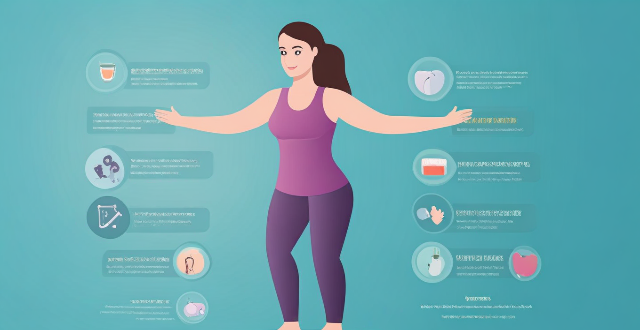Body Pregnancy

How can I modify my workout routine to accommodate my changing body during pregnancy ?
As a fitness enthusiast, it's important to adapt your workout routine as your body changes during pregnancy. Start with low-impact exercises like walking or swimming and gradually increase intensity over time. Focus on strength training and avoid high-impact activities like running or jumping. Listen to your body and adjust your workout routine accordingly. Hire a personal trainer if needed to create a customized workout routine that meets your needs and accommodates your changing body during pregnancy.

How can women improve their nutrition during pregnancy ?
During pregnancy, women need to consume a balanced diet that includes protein-rich foods, complex carbohydrates, healthy fats, vitamins, and minerals. They should avoid certain foods and substances like raw meats, unpasteurized milk, alcohol, and tobacco products. Staying hydrated and getting enough exercise is also important for maintaining good health during pregnancy.

Is it safe to start a new exercise program during pregnancy ?
Is it safe to start a new exercise program during pregnancy? This article explores the topic, highlighting health benefits and potential risks. It emphasizes consulting with healthcare providers, choosing appropriate exercises, and monitoring body responses for safety.

What are the best foods to eat during pregnancy ?
During pregnancy, it is important to consume a balanced diet that provides all the necessary nutrients for both mother and baby. Some of the best foods to eat during pregnancy include fruits, vegetables, protein sources, whole grains, dairy products, iron-rich foods, omega-3 fatty acids, and water. It is also important to avoid certain foods and limit caffeine intake.

Can exercise help reduce common pregnancy discomforts like back pain and swelling ?
Exercise can help alleviate common pregnancy discomforts like back pain and swelling by strengthening core muscles, improving posture, enhancing flexibility, promoting circulation, and reducing fluid retention. However, it's important to consult with a healthcare provider before starting any exercise program during pregnancy and follow safety precautions such as starting slowly, avoiding high-impact activities, staying hydrated, and listening to your body.

Can I continue my regular workout routine during pregnancy ?
During pregnancy, it is important to maintain a healthy lifestyle, including regular exercise. However, consulting with your healthcare provider before continuing any workout routine during pregnancy is crucial. Regular exercise can improve cardiovascular health, reduce the risk of gestational diabetes, and alleviate symptoms of depression and anxiety. It can also help control weight gain during pregnancy and make it easier to lose the baby weight after delivery. Low-impact cardio exercises, strength training, and flexibility exercises are safe options for pregnant women. It is essential to listen to your body, avoid high-risk activities, and stay hydrated and nourished. Seeking professional advice is crucial for first-time pregnancies, multiple gestation pregnancies, and pregnancies with complications. Continuing a regular workout routine during pregnancy can be beneficial for both you and your baby, but making necessary modifications to ensure safety and well-being is essential.

What types of exercises are safe for pregnant women ?
Exercise during pregnancy can be beneficial, but it'Exercise during pregnancy can be beneficial, but it' right type of exercises that are but it's important to choose the right type of exercises that are safe and effective. Here are some exercise options that pregnant women can consider: 1. **Cardiovascular Exercises** such as walking, swimming, stationary cycling, elliptical training, and low-impact aerobics. 2. **Strength Training** exercises like bodyweight exercises, resistance band exercises, and dumbbell exercises using light weights. 3. **Flexibility and Balance Exercises** including yoga (prenatal classes recommended), Pilates (modified for pregnancy), Tai Chi, and stretching exercises. It's crucial to consult with a healthcare provider before starting any exercise program, listen to your body, stay hydrated, avoid overheating, and steer clear of activities with a risk of falling or abdominal trauma.

What precautions should I take when exercising during pregnancy ?
Exercising during pregnancy is a great way to stay healthy and prepare for childbirth, but it's important to take precautions to ensure the safety of both you and your baby. Here are some tips: 1. Consult with your doctor before starting any exercise routine. 2. Start low and go slow, gradually increasing your intensity as your body gets stronger. 3. Pay attention to your body and stop exercising if you feel tired, uncomfortable, or in pain. 4. Drink plenty of water before, during, and after your workout. 5. Avoid exercising in hot environments or at high altitudes. 6. Use proper equipment that is adjusted for your height and weight and doesn't put pressure on your abdomen or pelvis. 7. Don't overdo it and take breaks when needed. 8. Get enough rest between workouts so that your body has time to recover fully. 9. Join a prenatal fitness class specifically designed for pregnant women. 10. Be prepared for emergencies by carrying emergency contact information with you and knowing how to respond in case of an emergency situation while exercising.

How can I stay motivated to exercise during pregnancy ?
To stay motivated to exercise during pregnancy, start small and set realistic goals. Find a workout buddy, mix up your routine with different activities, listen to your body's needs, and reward yourself for reaching milestones. Remember the benefits of exercising for both you and your baby's health.

Is it safe to exercise during pregnancy and what precautions should be taken ?
Is it safe to exercise during pregnancy? Yes, as long as you follow certain precautions and guidelines, including consulting your healthcare provider, choosing appropriate exercises, listening to your body, staying hydrated, wearing comfortable clothing, using proper technique, avoiding lying flat on your back, not pushing yourself too hard, cooling down properly, and being mindful of environmental factors. Exercise can have numerous benefits for pregnant women, such as reducing the risk of gestational diabetes, improving mood, increasing energy levels, and helping with recovery after birth.

What are the benefits of exercising during pregnancy ?
Exercising during pregnancy can improve physical fitness, reduce complications, enhance sleep quality, aid in faster recovery after childbirth, boost mood, lower depression risk, and improve cardiovascular health.

How does smoking affect a woman's ability to get pregnant ?
Smoking can severely impact a woman's fertility by reducing ovulation, damaging eggs and sperm, causing hormonal imbalances, decreasing endometrial receptivity, and increasing the risk of ectopic pregnancy. Quitting smoking is crucial for improving fertility and ensuring a healthy pregnancy. Seeking professional help, making lifestyle changes, and educating oneself about the harmful effects of smoking on fertility are recommended steps towards achieving a successful pregnancy.

What role do ovarian reserve tests play in understanding female fertility ?
Female fertility is influenced by age, health, and lifestyle choices, with ovarian reserve—the number and quality of eggs in the ovaries—playing a key role. Ovarian reserve tests measure hormones like AMH and FSH, and use ultrasound for AFC and ovarian volume assessments, to gauge reproductive potential. These tests aid in understanding chances of conception and guide treatment decisions without guaranteeing pregnancy outcomes. Women considering pregnancy or facing infertility should consult healthcare professionals about their ovarian reserve.

What are the effects of pregnancy and motherhood on women's mental health ?
The article discusses the impact of pregnancy and motherhood on women's mental health, highlighting both positive and negative effects. Positive effects include increased responsibility, improved social support, and enhanced emotional connection with the child. Negative effects may involve postpartum depression, anxiety disorders, and trauma-related disorders. Coping strategies such as seeking professional help, building a support network, and practicing self-care are recommended to manage any mental health challenges that arise during this period.

Do yoga poses have different effects on the body and mind ?
Yoga poses have different effects on the body and mind, including improved flexibility, strength, balance, stress reduction, concentration, and emotional release. Incorporating a variety of poses into your practice can help you achieve specific goals and transform your body and mind.

How does exercise influence hormone regulation in the body ?
Exercise affects hormone regulation in the body, impactingExercise affects hormone regulation in the body, impacting the intensity, duration, and impacting various hormones depending on the intensity, duration, and type of exercise. Regular exercise can increase testosterone levels in men and estrogen levels in women, reduce cortisol levels, and increase growth hormone levels. It can also improve insulin sensitivity and reduce insulin resistance, as well as maintain a healthy body fat distribution. However, excessive exercise or prolonged periods of intense training can have negative effects on hormone production and lead to low testosterone levels in men, low estrogen levels in women, high cortisol levels, low growth hormone levels, worsened insulin resistance, and decreased body fat distribution. Therefore, it is important to choose an appropriate type of exercise and maintain a balanced lifestyle for optimal hormone regulation and overall health.